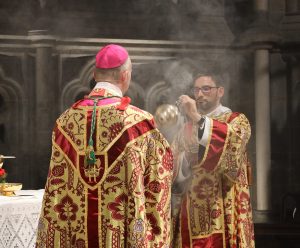Words on the Word
Chrism Mass 2025
Isaiah 61.1-9: For mourning robe, the oil of gladness.
Revelation 1.5-8: He has washed away our sins with his blood.
Luke 4.16-21: The Spirit of the Lord is upon me.
As our first reading for the Chrism Mass, the Church gives us an excerpt from the last part of Isaiah. In all of literature there’s hardly a text that more palpably trembles with joy. Broad is Isaiah’s perspective. It embraces the history of the world from its origin to its eschaton. It acknowledges human experience in all its aspects, from cruellest darkness to gentlest light.
 The prophecy proclaims that the birth-pangs through which the world passes serve a salvific purpose. An almighty benevolence proceeds even when evil rages and appears to reign. A message of joy is prepared through tears, the message of a strength that heals wounds, frees prisoners, breaks chains.
The prophecy proclaims that the birth-pangs through which the world passes serve a salvific purpose. An almighty benevolence proceeds even when evil rages and appears to reign. A message of joy is prepared through tears, the message of a strength that heals wounds, frees prisoners, breaks chains.
It is to describe this strength that Isaiah uses the images of the oil of gladness.
The oil represents life and thriving, in contrast to ashes, an image of death and grief The oil of gladness is a recurrent motif in Scripture. We find it in a Psalm that lyrically retells the story of creation. That great work culminates when man rejoices in the earth’s bounty, when the earth brings forth ‘wine to gladden man’s heart, oil to make his face shine’ (104.15). Another Psalm, ‘A Love Song’ expressing the Bible’s nuptial mysticism, says of the young man on his way to meet his beloved: ‘God has anointed you with the oil of gladness beyond your companions’ (45.8).
All of us long for such joy-anointing. We want to cast our straightjackets off, to stand radiant on the peak of a mountain and look out upon a harmonious world, to know love and fruitfulness.
From where does Biblical oil derive its joyful potential? The question is essential. The answer is clear. When Scripture speaks of oil, it is almost invariably in the context of sacrifice.
The first Biblical anointing was Aaron’s. On Sinai, inside the Glorious Cloud, Moses was instructed on how Israel was to worship within the terms of the covenant. The covenant was bilateral. Worship likewise flows in two directions at once: it serves to give God worthy honour while transmitting grace to a people constantly confronted with its shortcoming. Moses is told how the tabernacle is to be arranged, what sort of special equipment is called for. The vestments of the priests are described – very wonderful they are. All these ornaments come into their own, however, only when Aaron is anointed as mediator between the Lord of the universe and Israel. When everything is materially ready, Moses is told to vest Aaron and his sons: ‘And you shall … anoint them and ordain them and consecrate them, so that they may serve me as priests’ (Exodus 28.41).
By virtue of his anointing, Aaron is incorporated into the sacrifice he is ordained to offer. He is not not an official employed to work from 9 to 5; nor is he an artisan like the carpenters, tailors, and goldsmiths mobilised to come up with equipment for the cult. The anointing makes of Aaron himself a cultic being. He is ‘consecrated’ in the sense that he is set aside for a purpose; that purpose alone will henceforth make sense of his existence. Aaron’s ordination is joy: remembrance of the ‘precious oil’ poured out upon his head, ‘running down upon the beard, Aaron’s beard’ becomes, through the Psalter, a symbol of bliss (Psalm 133.2). At the same time his ordination confers immense responsibility. Aaron is the instrument God has chosen for reconciliation. Both the people’s sins and the Lord’s mercy will mysteriously pass through him, body and soul.
To be that sort of live wire one must be strong, and humble.
My dear brothers, we have been consecrated as priests according to the new covenant sealed in the Blood of Jesus Christ. Nonetheless a line of continuity unites us to the orientation of Aaron. Before we ourselves were anointed with Sacred Chrism, the bishop invoked upon us the grace given to Aaron and his sons. We are not primarily administrators. We are called to be incorporated into the sacrifice of Christ. The longer we are priests, the more lucidly we recognise what it is all about: our own lives must be laid down on the altar, like the hosts we offer daily. The hosts we use have, objectively speaking, neither much taste nor much substance. That is not what matters. God’s transforming power, poured out through the Church, can make realities poor in themselves into something infinitely precious and nourishing.
Before we offered our first Mass, we knelt before the bishop and received the eucharistic elements, the bread and wine. The bishop then addressed to us a sublime exhortation:
Understand what you do, imitate what you celebrate, and conform your life to the mystery of the Lord’s cross.
We all know from experience that life on these terms is costly, so costly that we sometimes think we can’t endure it — alone the Lord’s grace sustains us at such times. A priest must live by prayer, rooted in the mystery of the Passion. But we know, too, that the anointing which drew us into Christ’s sacrifice is pure joy! What exultation we priests know when salvific strength flows through our poverty and parched land becomes fruitful, tears are wiped away, death turns to life. Today we renew our priestly promises. We proclaim that we will be faithful to the vows we have made, that Christ may freely act in us, to the praise and glory of his name and for the world’s salvation. 
There is no contradiction, as the world tends to assume, between sacrifice and fullness of joy. It is by pouring ourselves out that we learn what it is to live fully. True life is not a possession we keep in a safe; it is a gift we receive, to pass it on.
There’s a particular element in the course of Mass that impresses me more and more as the years pass. It is when, after incensing the gifts on the altar, I turn towards the deacon or acolyte to be incensed in turn. The acolyte incenses me, not because I am anything special, but in order that I might become a serviceable host, an immaculate oblation through which God can work. What matters then is to say Yes! with an undivided heart.
Thank you, dear brethren, for your persevering Yes! Thank you for faithfully resolving to keep carrying God’s joy and consolation into a world of tears. May your priestly anointing give you joy a hundredfold in this life, eternal beatitude in the next.
In the name of Jesus! Amen.
